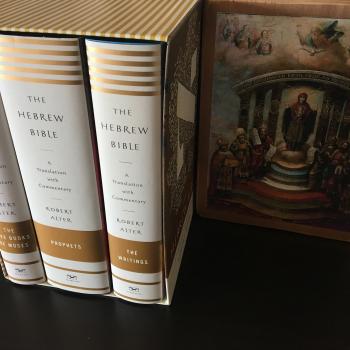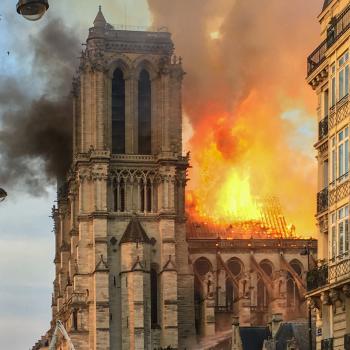When I first began hearing about St. Peter’s Fireside a few years ago, I had heard that they had on staff with them an intellectual — some said a ‘genius’ — and that his name was Roger Revell. I was told that we would have fun talking. With these posts and ongoing conversation among Douglas Todd, the St. Peter’s Fireside staff, and yours truly (as Stanley Hauerwas is said to have said to Catherine Pickstock at their first meeting chronicled in legend, ‘Hi, I’m the turd in the punchbowl!’), I feel like this is an odd, yet providential, place to have met, though I am no genius. It has been certainly been a pleasure, and I hope that my sentiments are reciprocated.
Roger Revell has outdone himself this time. In what appears to be the most complex and intricate post in the St. Peter’s Fireside ten-part blog series response to Douglas Todd’s ten-point primer on ‘liberal Christianity,’ Revell gives an ingeniously complicated answer as to whether ‘classical Christians’ oppose evolutionary biology. This is in response to Todd, who has written emphatically on how liberal Christians disavow an embarrassing fundamentalist insistence on creationism:
Liberal Christians are definitely not Creationists (neither is every conservative Christian). They don’t believe schools should teach God formed the world in six days, etc. Instead, liberal Christians are environmentalists who have expanded Charles Darwin’s evolutionary theories into a metaphysics, often called process theology or panentheism. Some of liberal Christianity’s biggest names are evolutionary theists such as Pierre Teilhard de Chardin, John Cobb, Michael Dowd, Sallie McFague, Ian Barbour and John Haught. Liberal Christians want to learn from scientists and want scientists to learn from philosophy and spirituality.
Revell has a complicated answer. Giving a nod to geographer David Livingstone’s Darwin’s Forgotten Defenders and Adam’s Ancestors, Revell correctly notes that when Darwin first published his findings, he was embraced by some of the evangelical luminaries of the time. Siding with Todd, Revell then shows that there is in fact a spectrum of views on evolutionary biology among evangelical Christians, from practicing biologists to diehard creationists. It’s for this that I have to give a standing ovation to Revell, for he has rightly moved the conversation away from an evolution v. creation food fight into a complex conversation with very blurry battle lines. I’m sure that Evolving in Monkey Town‘s Rachel Held Evans would also be pleased with his nuanced picture.
Revell’s protest is thus not about evolution — it’s about what Todd calls an evolutionary ‘metaphysics.’ For Revell, that smacks of ‘atheistic naturalism,’ a theology that would see little use for an actual ‘personal, powerful, and present God of the Bible’ (emphasis Revell’s). Reading Todd’s ‘process theology’ and wholehearted ’embrace of evolution and science’ as proposing a radically natural theology, i.e. where empirical observation of nature is all that can actually be known, Revell rejects an ‘evolutionary metaphysics’ on the basis that it would be radically secularizing, disposing any need for the personal God with whom classical Christians insist on relating.
The only problem with Revell’s protest against this kind of natural theology — the kind that both Karl Barth and Stanley Hauerwas also pushed back against in their Gifford Lectures (an endowed lectureship in Scotland on natural theology) — is that it’s not actually what Todd is talking about. To call, say, the process theology of Pierre Teilhard de Chardin, SJ, an ‘atheistic naturalism’ is really to miss the point. As Todd himself clarifies, his reference to an evolutionary metaphysics is about panentheism, emphatically not a radically empirical naturalism, and the integration of theology with science is much more about what Pamela Klassen has called ‘scientific supernaturalism,’ an attempt on the part of liberal Protestants (in Klassen’s own analysis) to use science to understand supernatural, psychic, and paranormal processes. What Todd is saying is that if liberal Protestantism were the X-Files, they wouldn’t be the skeptics — they’d be Agent Mulder.
Put this way, the old stereotypes about ‘liberal Christians’ as agents of radical secularization fall apart. As Klassen reminds us, this means that ‘liberal Christians’ take seriously the supernatural, so much so that they want to understand it deeply using scientific vocabularies and methodologies.
The question is if this modus operandi can be described as classical.
I put the ‘SJ’ after Pierre Teilhard de Chardin to underscore a point: he was a Jesuit. In The Phenomenon of Man, de Chardin lays out precisely why he’s using an evolutionary approach to develop a ‘process theology,’ that is, a scientific account of the gradual evolution of human consciousness of the supernatural. For de Chardin, that’s a perfectly valid theological move because early medieval theologians once used Plato and Neoplatonism to do their theology, only to have that discarded by late medieval scholastics for Aristotle. If philosophical paradigms can shift like that in theological methods, then why not experiment with an evolutionary approach?
Experimental though de Chardin was, another Jesuit scholar, Henri de Lubac, SJ, would affirm that de Chardin’s approach is definitely classical. In his classic Catholicism: Christ and the Common Destiny of Man, de Lubac demonstrates that what it means to be Catholic from the church fathers is to be able to incorporate all kinds of philosophical traditions into Christian thinking by focusing them all onto the central person of Jesus Christ. As with de Chardin, de Lubac argues by the end of the book that this surely means that modernity, though condemned outright by Pius IX in the Syllabus of Errors, can in fact be incorporated into Catholic thought because incorporating different modes of thinking is what it means to be Catholic. (You see why Pius XII also condemned this stuff in Humani Generis — the irony was that the next two popes had many of these guys as the theological experts at the Second Vatican Council!) As Canadian philosopher Charles Taylor puts it, this should be called a Catholic modernity, that is, a scientific, evolutionary rationality whose thinking is focused on the God who becomes flesh in Jesus Christ. It’s no wonder that the exorcist in The Exorcist was based on Pierre Teilhard de Chardin.
Given this, I’d encourage Revell to revisit his disavowal of an ‘evolutionary metaphysics.’ Is he sure that all evolutionary metaphysics will do is to lead down to the path of atheistic naturalism? After all, if de Chardin, de Lubac, and Taylor are correct, ‘liberal Christians’ have nothing to worry about as far as ‘naturalism’ is concerned. Instead of tossing the supernatural, they’d be way more invested in what de Lubac called the surnaturel, the suspended middle between nature and grace, than most other Christians. In other words, an ‘evolutionary metaphysics’ may be more classically Christian than anyone expects.
And so it was when UBC’s Graduate Faculty Christian Forum invited evolutionary paleobiologist Simon Conway Morris to speak in 2009. Aside from being Austin Powers’s doppelganger, Morris unexpectedly presented a metaphysics from his work in evolutionary paleobiology — i.e. the fossil record — that had its grounding in the work of the Inklings — J.R.R. Tolkien, C.S. Lewis, Owen Barfield, Charles Williams, etc. For an evangelical crowd, this was certainly unexpected — who could have predicted, for example, that the supernatural worlds of Narnia and Middle-earth would be commensurate with evolutionary paleontology? But if we had read de Chardin and de Lubac, this would have been no surprise, for it’s in the deep unknown of primal history where science converges with poetry, song, and art. A Catholic modernity is no naturalist fundamentalism, no disenchanted iron cage. It is a return to a world of enchantment where scientists confess that nature may well be a channel of divine grace, an urge to reveal that the classical Christian faith does not only confess a personal Creator God but where that God’s Spirit continues to hover over the waters of the deep and renew the face of the earth.
Come, Holy Spirit, fill the hearts of your people and kindle in them the fire of your love. Send forth your Spirit, and they are created, and you renew the face of the earth.
God, who taught the hearts of your people by the inspiration of the Holy Spirit, send that same Spirit into our hearts, that we may always be truly wise, and ever rejoice in his consolation, through Christ our Lord. Amen.
This we pray especially for Alastair Sterne as he posts the next piece on ‘abortion, homosexuality, and not-so-hot-button issues.’ He’ll need it.











